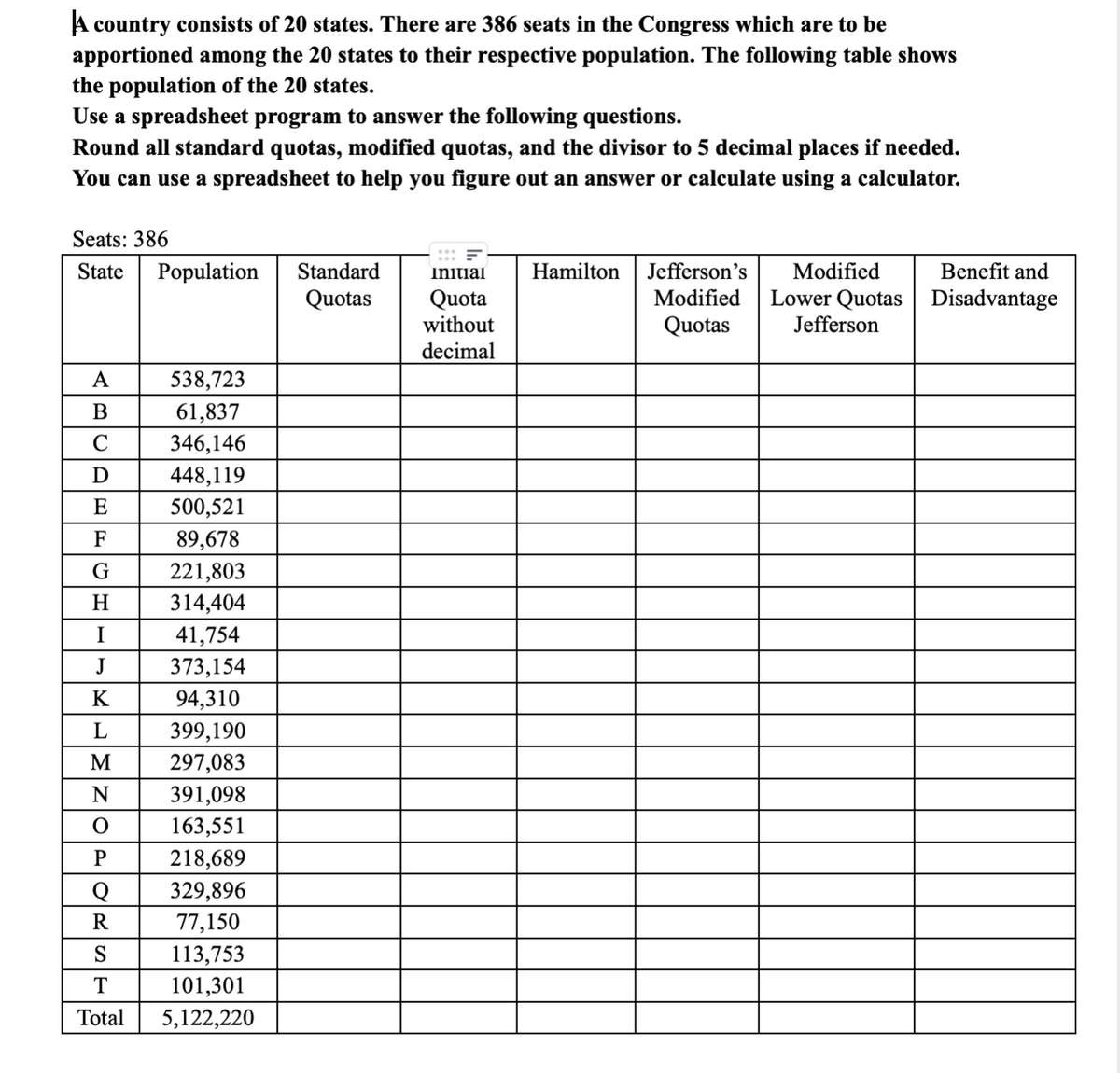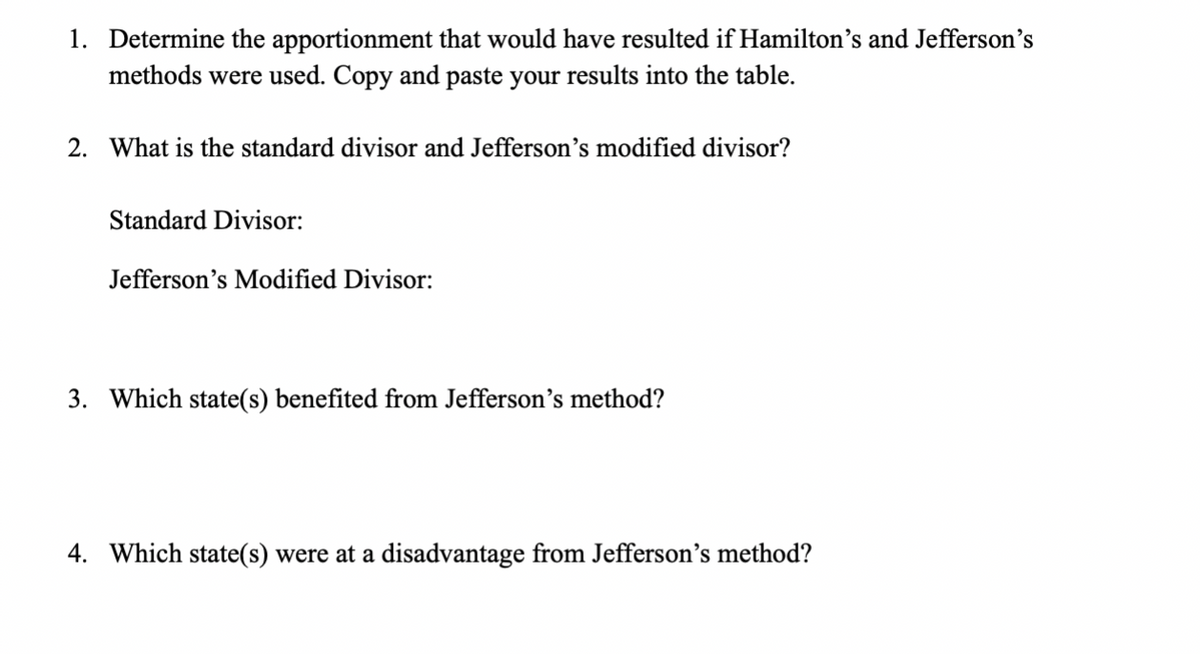61,837 346,146 448,119 500,521 89,678 221,803 314,404 41,754 373,154 94,310 399,190 297,083 391,098 163,551 218,689 329,896 77,150 113,753 101,301 5,122,220
61,837 346,146 448,119 500,521 89,678 221,803 314,404 41,754 373,154 94,310 399,190 297,083 391,098 163,551 218,689 329,896 77,150 113,753 101,301 5,122,220
MATLAB: An Introduction with Applications
6th Edition
ISBN:9781119256830
Author:Amos Gilat
Publisher:Amos Gilat
Chapter1: Starting With Matlab
Section: Chapter Questions
Problem 1P
Related questions
Question
100%

Transcribed Image Text:A country consists of 20 states. There are 386 seats in the Congress which are to be
apportioned among the 20 states to their respective population. The following table shows
the population of the 20 states.
Use a spreadsheet program to answer the following questions.
Round all standard quotas, modified quotas, and the divisor to 5 decimal places if needed.
You can use a spreadsheet to help you figure out an answer or calculate using a calculator.
Seats: 386
State
Population
Standard
Initial
Hamilton
Jefferson's
Modified
Benefit and
Lower Quotas Disadvantage
Jefferson
Quotas
Quota
without
Modified
Quotas
decimal
A
538,723
61,837
C
346,146
448,119
D
E
500,521
89,678
221,803
F
G
H
314,404
41,754
373,154
I
J
K
94,310
399,190
M
297,083
N
391,098
163,551
P
218,689
Q
329,896
77,150
113,753
R
S
101,301
Total
5,122,220

Transcribed Image Text:1. Determine the apportionment that would have resulted if Hamilton's and Jefferson's
methods were used. Copy and paste your results into the table.
2. What is the standard divisor and Jefferson's modified divisor?
Standard Divisor:
Jefferson's Modified Divisor:
3. Which state(s) benefited from Jefferson's method?
4. Which state(s) were at a disadvantage from Jefferson's method?
Expert Solution
This question has been solved!
Explore an expertly crafted, step-by-step solution for a thorough understanding of key concepts.
This is a popular solution!
Trending now
This is a popular solution!
Step by step
Solved in 3 steps

Recommended textbooks for you

MATLAB: An Introduction with Applications
Statistics
ISBN:
9781119256830
Author:
Amos Gilat
Publisher:
John Wiley & Sons Inc

Probability and Statistics for Engineering and th…
Statistics
ISBN:
9781305251809
Author:
Jay L. Devore
Publisher:
Cengage Learning

Statistics for The Behavioral Sciences (MindTap C…
Statistics
ISBN:
9781305504912
Author:
Frederick J Gravetter, Larry B. Wallnau
Publisher:
Cengage Learning

MATLAB: An Introduction with Applications
Statistics
ISBN:
9781119256830
Author:
Amos Gilat
Publisher:
John Wiley & Sons Inc

Probability and Statistics for Engineering and th…
Statistics
ISBN:
9781305251809
Author:
Jay L. Devore
Publisher:
Cengage Learning

Statistics for The Behavioral Sciences (MindTap C…
Statistics
ISBN:
9781305504912
Author:
Frederick J Gravetter, Larry B. Wallnau
Publisher:
Cengage Learning

Elementary Statistics: Picturing the World (7th E…
Statistics
ISBN:
9780134683416
Author:
Ron Larson, Betsy Farber
Publisher:
PEARSON

The Basic Practice of Statistics
Statistics
ISBN:
9781319042578
Author:
David S. Moore, William I. Notz, Michael A. Fligner
Publisher:
W. H. Freeman

Introduction to the Practice of Statistics
Statistics
ISBN:
9781319013387
Author:
David S. Moore, George P. McCabe, Bruce A. Craig
Publisher:
W. H. Freeman